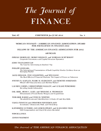
JOURNAL OF FINANCE
Scope & Guideline
Empowering researchers with rigorous empirical analysis.
Introduction
Aims and Scopes
- Financial Markets and Institutions:
Research exploring the functioning, structure, and dynamics of financial markets and institutions, including their roles in economic systems. - Behavioral Finance:
Studies that investigate psychological factors influencing investor behavior and market outcomes, including sentiment analysis and cognitive biases. - Corporate Finance:
Examination of corporate financial policies, including capital structure, dividend policies, risk management, and the impact of managerial decisions on firm performance. - Risk Management and Financial Stability:
Research focused on understanding financial risks, systemic risks, and the effectiveness of regulatory frameworks in ensuring financial stability. - Sustainability and ESG (Environmental, Social, Governance) Factors:
Analysis of how sustainability practices and ESG considerations influence investment decisions, corporate behavior, and financial performance. - FinTech and Innovation:
Exploration of the impact of financial technology on traditional finance, investment strategies, and the efficiency of financial markets. - Quantitative and Empirical Finance:
Utilization of quantitative methods, statistical models, and empirical analysis to derive insights from financial data and market behavior.
Trending and Emerging
- Integration of ESG Factors:
A significant increase in research focused on the integration of ESG factors into investment decision-making and corporate strategies, reflecting a growing emphasis on sustainability in finance. - FinTech Innovations:
Emerging studies on the impact of FinTech innovations, including blockchain and cryptocurrencies, on traditional financial systems and investment strategies. - Behavioral Insights in Finance:
A notable rise in research examining behavioral finance, particularly how cognitive biases and emotional factors influence investor decisions and market trends. - Data Science and Machine Learning Applications:
Growing interest in applying data science and machine learning techniques to finance, particularly for predictive analytics, risk assessment, and trading strategies. - Macroeconomic Policy Effects:
Increased focus on the implications of macroeconomic policies, such as monetary policy and fiscal stimulus, on financial markets and corporate finance. - Crisis Management and Resilience:
Emerging themes related to crisis management strategies in finance, particularly in response to recent global crises, emphasizing the importance of resilience in financial systems.
Declining or Waning
- Traditional Valuation Models:
A noticeable decrease in publications focusing on classical valuation models, as researchers increasingly turn to alternative frameworks or behavioral factors influencing valuations. - Historical Financial Crises Analysis:
Reduced emphasis on historical case studies of financial crises, as the focus shifts towards real-time analyses and predictive modeling in current market conditions. - Conventional Risk Assessment Metrics:
Diminishing interest in traditional risk assessment metrics such as Value-at-Risk (VaR), as new methodologies and technologies emerge that offer more nuanced risk evaluations. - Static Asset Pricing Models:
A decline in the application of static asset pricing models, with researchers favoring dynamic models that account for market volatility and behavioral factors. - Microeconomic Foundations of Finance:
Less focus on microeconomic theories underpinning financial decisions, as the field moves towards more integrated approaches that include macroeconomic perspectives.
Similar Journals
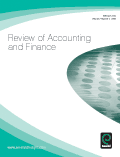
Review of Accounting and Finance
Exploring the Frontiers of Financial InsightReview of Accounting and Finance, published by EMERALD GROUP PUBLISHING LTD, is a prestigious academic journal with a longstanding commitment to advancing scholarship in the fields of accounting, finance, and economics. With an ISSN of 1475-7702 and E-ISSN of 1758-7700, this journal has established itself as a key resource for researchers, professionals, and students seeking robust empirical and theoretical insights. It enjoys a strong reputation, reflected in its 2023 Scopus rankings, where it is positioned in the top quartile for Economics and Finance, and holds a Q2 category in Accounting. The journal covers a wide range of topics, aiming to foster discussion and disseminate knowledge that bridges the gap between theory and practice. Although it does not offer open access, its comprehensive scope is invaluable for those dedicated to understanding the complexities of financial systems and accounting practices from a global perspective. Published continuously from 2002 to 2024, the Review of Accounting and Finance is an essential outlet for innovative research that drives the discipline forward.
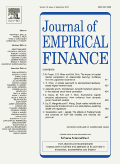
Journal of Empirical Finance
Connecting theory and practice in empirical finance.Journal of Empirical Finance, published by Elsevier, stands as a key resource in the areas of finance and economics, with a definitive focus on empirical studies. As a prominent journal since its inception in 1993, it has made significant strides in contributing to the academic community, evidenced by its soaring categorization in Q1 for Finance and Q2 for Economics and Econometrics as of 2023. With an ISSN of 0927-5398 and an E-ISSN of 1879-1727, the journal emphasizes robust, data-driven analysis to inform both theoretical and practical aspects of financial research. While access options do not include open access, the journal ensures that its content remains accessible to a diverse audience of researchers, professionals, and students. It fosters a platform for innovative research and discourse, significantly impacting the fields of finance, economics, and econometrics. The Scopus rankings further bolster its reputation, placing it in the 61st percentile in both categories, reflecting a commitment to high-quality research output. As the journal continues to evolve, it invites contributions that push the boundaries of empirical finance, enabling a deeper understanding of financial mechanisms that drive global economies.
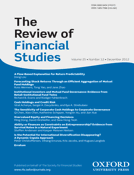
REVIEW OF FINANCIAL STUDIES
Navigating the Complexities of Financial ResearchREVIEW OF FINANCIAL STUDIES, published by Oxford University Press Inc, stands as a premier academic journal in the realms of accounting, economics, and finance. With an impressive Impact Factor that reflects its high citation rates and broad influence, this journal, with an ISSN of 0893-9454 and E-ISSN 1465-7368, is considered a cornerstone for researchers, academics, and professionals seeking to contribute to and stay updated on groundbreaking developments in financial studies. Since its inception in 1996, it has established a robust reputation, consistently ranking in the Q1 category across multiple disciplines, highlighting its elite status in the global academic landscape. The Scopus rankings further reinforce its importance, positioning it at the forefront of business, economics, and finance research. While the journal is not open access, it offers vital insights and comprehensive studies that foster a deeper understanding of contemporary financial issues and methodologies. Located in the United Kingdom, the REVIEW OF FINANCIAL STUDIES is an essential resource for those aiming to advance their knowledge and research in this dynamic field.

International Review of Finance
Advancing financial knowledge through rigorous research.International Review of Finance is a prestigious academic journal published by Wiley, located in the United Kingdom. With its ISSN 1369-412X and E-ISSN 1468-2443, this journal serves as an essential platform for researchers and practitioners in the fields of Economics and Finance. Ranked in the Q2 quartile for both Economics and Econometrics and Finance as of 2023, it showcases high-quality research that contributes significantly to theoretical and practical advancements. Reflecting its standing, the journal is positioned in the 61st percentile in Economics and Econometrics and the 60th percentile in Finance according to Scopus rankings. The scope of the journal includes a diverse range of topics, encouraging innovative discourse across various financial disciplines. Although it does not offer open access, the International Review of Finance continues to be an important resource for academics, professionals, and students seeking to deepen their understanding of evolving financial theories and practices.
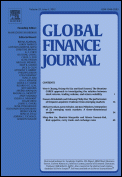
Global Finance Journal
Illuminating critical issues in global finance.Global Finance Journal is an esteemed periodical published by Elsevier, dedicated to the dynamic fields of finance and economics. With an impressive history spanning from 1989 to 2024, this journal holds a significant position in the academic community, boasting a Q1 quartile ranking in both Economics and Econometrics, as well as Finance, as of 2023. It is highly regarded in Scopus rankings, placing 40th out of 317 in Finance and 99th out of 716 in Economics and Econometrics, demonstrating its influence and reach among researchers and practitioners alike. Although not an open-access journal, the Global Finance Journal provides rigorous peer-reviewed articles that explore critical issues, advance theoretical frameworks, and address practical applications in global finance. As such, it serves as a vital resource for researchers, financial professionals, and students aiming to deepen their understanding of economic phenomena and contribute to the ongoing discourse in these vibrant disciplines.

Financial Innovation
Shaping Tomorrow's Financial Practices TodayFinancial Innovation, published by Springer, is a premier open access journal that has been contributing to the fields of finance and management of technology and innovation since its inception in 2015. With an impressive Q1 category ranking in both Finance and Management of Technology and Innovation, the journal places itself at the forefront of academic research, reflected in its Scopus rankings—#17 out of 317 in Finance (94th percentile) and #29 out of 289 in Management of Technology and Innovation (90th percentile). Centered in Germany, this journal aims to disseminate high-quality research that fosters theoretical and practical advancements within its scope, encouraging exchanges between academia and industry. The open access model enhances visibility and accessibility of published research, thus playing a critical role in shaping the future of financial practices and technology management. For researchers, professionals, and students alike, Financial Innovation remains essential for staying abreast of cutting-edge developments and trends in these dynamic fields.
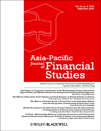
Asia-Pacific Journal of Financial Studies
Pioneering Financial Discourse in the Asia-Pacific LandscapeAsia-Pacific Journal of Financial Studies is a premier academic journal published by WILEY, dedicated to advancing the field of finance within the dynamic Asia-Pacific region. With an ISSN of 2041-9945 and an E-ISSN of 2041-6156, this journal stands out for its rigorous peer-reviewed research spanning various topics in finance, making it a vital resource for researchers, practitioners, and students alike. It has achieved an impressive Q2 ranking in Finance as of 2023, placing it within the top half of finance journals as measured by its relevance and quality of contributions in the Scopus Economics, Econometrics and Finance category. Additionally, the journal supports researchers with robust access options, promoting broader dissemination of knowledge. Its dedicated focus from 2006 to 2024 highlights the journal's commitment to continuous scholarly exchange and innovation in financial studies. As it thrives in the competitive landscape of scholarly publishing, the Asia-Pacific Journal of Financial Studies not only enriches academic discourse but also informs practices that shape financial markets and policies in the region.

Pacific-Basin Finance Journal
Empowering Researchers with Cutting-Edge Finance InsightsPacific-Basin Finance Journal is a prestigious academic journal that focuses on critical developments and innovative research within the fields of finance and economics, specifically tailored to the Pacific region's unique economic landscape. Published by Elsevier, the journal boasts an impressive impact factor and is categorized in the Q1 quartile for both Economics and Econometrics and Finance as of 2023. This indicates its high relevance and position among the top journals in its field, with Scopus rankings reflecting a strong standing in the competitive landscape of finance research, holding the 45th position out of 317 in Finance and the 108th in Econometrics. Established in 1993, the journal is committed to disseminating rigorous theoretical and empirical research findings that enhance the understanding of financial systems in the Pacific Basin. Although the journal is not open access, it provides invaluable insights and comprehensive studies aimed at professionals, researchers, and students alike, fostering a deeper comprehension of the region's economic dynamics and global interconnectedness.

JOURNAL OF FINANCIAL ECONOMICS
Transforming theoretical frameworks into practical solutions.Welcome to the JOURNAL OF FINANCIAL ECONOMICS, a premier publication in the realms of finance, economics, and accounting, published by Elsevier Science SA in the Netherlands. With its impactful contributions since 1974, this esteemed journal has earned an impressive impact factor and consistently ranks in the Q1 category across various fields, including Accounting, Economics and Econometrics, Finance, and Strategy and Management. Researchers can access cutting-edge studies that delve into both theoretical frameworks and empirical analyses, crucial for advancing financial literacy and economic policies globally. With remarkable Scopus rankings, notably placing #2 in Accounting and #6 in Finance, the journal serves not only as a reliable resource for academics but also as a vital tool for professionals seeking to stay abreast of the latest financial trends and insights. Engage with the latest research and contribute to the dialogue shaping the future of financial economics!
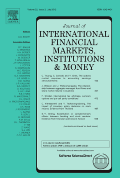
Journal of International Financial Markets Institutions & Money
Transforming Perspectives on Financial SystemsThe Journal of International Financial Markets, Institutions & Money, published by Elsevier, serves as a leading platform for the dissemination of high-quality research in the fields of finance, economics, and econometrics. With an impressive impact factor reflected in its status as a Q1 journal in both categories for 2023, it ranks among the top journals, positioned at #47 out of 317 in Finance and #111 out of 716 in Economics. This journal offers a unique focus on the interplay between financial markets and institutions on a global scale, making it an essential resource for scholars, practitioners, and students alike. The journal welcomes innovative theoretical, empirical, and applied research, contributing to an exciting dialogue that shapes the future of international finance. For researchers looking to publish their findings, this journal is committed to rigorously engaging with contemporary financial phenomena, positioning itself as a vital cornerstone of academic and professional discourse.